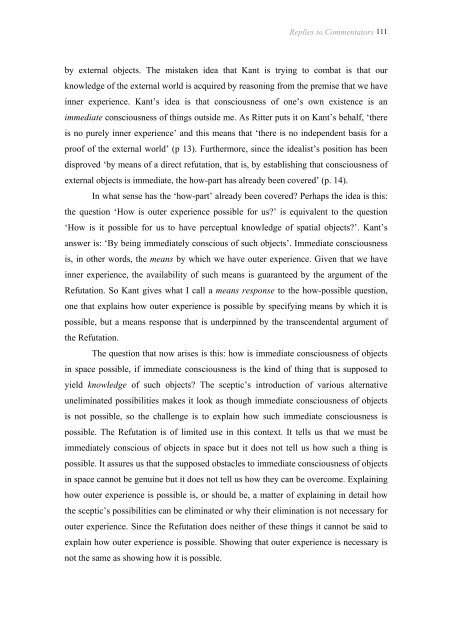Complete Issue in PDF - Abstracta
Complete Issue in PDF - Abstracta
Complete Issue in PDF - Abstracta
You also want an ePaper? Increase the reach of your titles
YUMPU automatically turns print PDFs into web optimized ePapers that Google loves.
Replies to Commentators 111<br />
by external objects. The mistaken idea that Kant is try<strong>in</strong>g to combat is that our<br />
knowledge of the external world is acquired by reason<strong>in</strong>g from the premise that we have<br />
<strong>in</strong>ner experience. Kant’s idea is that consciousness of one’s own existence is an<br />
immediate consciousness of th<strong>in</strong>gs outside me. As Ritter puts it on Kant’s behalf, ‘there<br />
is no purely <strong>in</strong>ner experience’ and this means that ‘there is no <strong>in</strong>dependent basis for a<br />
proof of the external world’ (p 13). Furthermore, s<strong>in</strong>ce the idealist’s position has been<br />
disproved ‘by means of a direct refutation, that is, by establish<strong>in</strong>g that consciousness of<br />
external objects is immediate, the how-part has already been covered’ (p. 14).<br />
In what sense has the ‘how-part’ already been covered? Perhaps the idea is this:<br />
the question ‘How is outer experience possible for us?’ is equivalent to the question<br />
‘How is it possible for us to have perceptual knowledge of spatial objects?’. Kant’s<br />
answer is: ‘By be<strong>in</strong>g immediately conscious of such objects’. Immediate consciousness<br />
is, <strong>in</strong> other words, the means by which we have outer experience. Given that we have<br />
<strong>in</strong>ner experience, the availability of such means is guaranteed by the argument of the<br />
Refutation. So Kant gives what I call a means response to the how-possible question,<br />
one that expla<strong>in</strong>s how outer experience is possible by specify<strong>in</strong>g means by which it is<br />
possible, but a means response that is underp<strong>in</strong>ned by the transcendental argument of<br />
the Refutation.<br />
The question that now arises is this: how is immediate consciousness of objects<br />
<strong>in</strong> space possible, if immediate consciousness is the k<strong>in</strong>d of th<strong>in</strong>g that is supposed to<br />
yield knowledge of such objects? The sceptic’s <strong>in</strong>troduction of various alternative<br />
unelim<strong>in</strong>ated possibilities makes it look as though immediate consciousness of objects<br />
is not possible, so the challenge is to expla<strong>in</strong> how such immediate consciousness is<br />
possible. The Refutation is of limited use <strong>in</strong> this context. It tells us that we must be<br />
immediately conscious of objects <strong>in</strong> space but it does not tell us how such a th<strong>in</strong>g is<br />
possible. It assures us that the supposed obstacles to immediate consciousness of objects<br />
<strong>in</strong> space cannot be genu<strong>in</strong>e but it does not tell us how they can be overcome. Expla<strong>in</strong><strong>in</strong>g<br />
how outer experience is possible is, or should be, a matter of expla<strong>in</strong><strong>in</strong>g <strong>in</strong> detail how<br />
the sceptic’s possibilities can be elim<strong>in</strong>ated or why their elim<strong>in</strong>ation is not necessary for<br />
outer experience. S<strong>in</strong>ce the Refutation does neither of these th<strong>in</strong>gs it cannot be said to<br />
expla<strong>in</strong> how outer experience is possible. Show<strong>in</strong>g that outer experience is necessary is<br />
not the same as show<strong>in</strong>g how it is possible.




